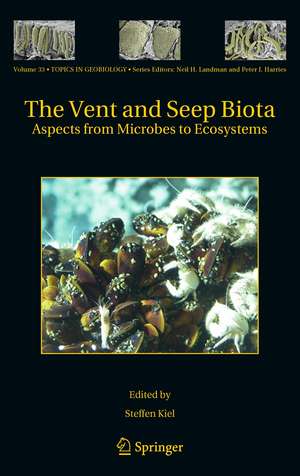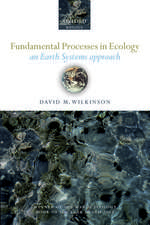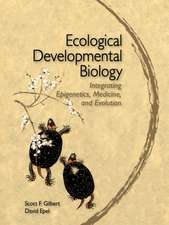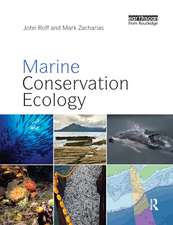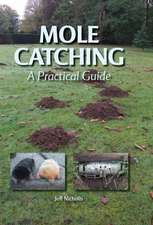The Vent and Seep Biota: Aspects from Microbes to Ecosystems: Topics in Geobiology, cartea 33
Editat de Steffen Kielen Limba Engleză Paperback – 6 noi 2012
| Toate formatele și edițiile | Preț | Express |
|---|---|---|
| Paperback (1) | 1225.94 lei 6-8 săpt. | |
| SPRINGER NETHERLANDS – 6 noi 2012 | 1225.94 lei 6-8 săpt. | |
| Hardback (1) | 1230.66 lei 6-8 săpt. | |
| SPRINGER NETHERLANDS – 17 sep 2010 | 1230.66 lei 6-8 săpt. |
Din seria Topics in Geobiology
- 18%
 Preț: 1858.10 lei
Preț: 1858.10 lei - 20%
 Preț: 822.09 lei
Preț: 822.09 lei - 15%
 Preț: 672.43 lei
Preț: 672.43 lei - 18%
 Preț: 1236.82 lei
Preț: 1236.82 lei - 15%
 Preț: 647.59 lei
Preț: 647.59 lei - 24%
 Preț: 885.06 lei
Preț: 885.06 lei - 18%
 Preț: 951.59 lei
Preț: 951.59 lei - 18%
 Preț: 964.23 lei
Preț: 964.23 lei - 18%
 Preț: 1117.69 lei
Preț: 1117.69 lei - 15%
 Preț: 633.31 lei
Preț: 633.31 lei - 18%
 Preț: 966.27 lei
Preț: 966.27 lei - 18%
 Preț: 952.54 lei
Preț: 952.54 lei - 18%
 Preț: 949.85 lei
Preț: 949.85 lei - 18%
 Preț: 1013.50 lei
Preț: 1013.50 lei - 24%
 Preț: 821.19 lei
Preț: 821.19 lei - 18%
 Preț: 952.40 lei
Preț: 952.40 lei - 18%
 Preț: 961.23 lei
Preț: 961.23 lei - 18%
 Preț: 952.26 lei
Preț: 952.26 lei - 18%
 Preț: 960.42 lei
Preț: 960.42 lei - 18%
 Preț: 1843.11 lei
Preț: 1843.11 lei - 18%
 Preț: 954.31 lei
Preț: 954.31 lei - 18%
 Preț: 1256.41 lei
Preț: 1256.41 lei - 18%
 Preț: 959.50 lei
Preț: 959.50 lei - 15%
 Preț: 673.60 lei
Preț: 673.60 lei - 18%
 Preț: 954.14 lei
Preț: 954.14 lei - 15%
 Preț: 640.06 lei
Preț: 640.06 lei - 18%
 Preț: 959.36 lei
Preț: 959.36 lei
Preț: 1225.94 lei
Preț vechi: 1495.04 lei
-18% Nou
Puncte Express: 1839
Preț estimativ în valută:
234.58€ • 255.61$ • 197.67£
234.58€ • 255.61$ • 197.67£
Carte tipărită la comandă
Livrare economică 23 aprilie-07 mai
Preluare comenzi: 021 569.72.76
Specificații
ISBN-13: 9789400733398
ISBN-10: 9400733399
Pagini: 490
Ilustrații: XIV, 490 p.
Dimensiuni: 155 x 235 x 25 mm
Greutate: 0.68 kg
Ediția:2010
Editura: SPRINGER NETHERLANDS
Colecția Springer
Seria Topics in Geobiology
Locul publicării:Dordrecht, Netherlands
ISBN-10: 9400733399
Pagini: 490
Ilustrații: XIV, 490 p.
Dimensiuni: 155 x 235 x 25 mm
Greutate: 0.68 kg
Ediția:2010
Editura: SPRINGER NETHERLANDS
Colecția Springer
Seria Topics in Geobiology
Locul publicării:Dordrecht, Netherlands
Public țintă
Professional/practitionerCuprins
Chemosynthetically-Driven Ecosystems in the Deep Sea.- Genetics and Evolution of Deep-Sea Chemosynthetic Bacteria and Their Invertebrate Hosts.- Microbial Habitats Associated with Deep-Sea Hydrothermal Vent Invertebrates: Insights from Microanalysis and Geochemical Modeling.- Microbial Chemofossils in Specific Marine Hydrothermal and Methane Cold Seep Settings.- Chemosymbiotic Bivalves.- The Diversity of Deep-Sea Mussels and Their Bacterial Symbioses.- Gastropods from Recent Hot Vents and Cold Seeps: Systematics, Diversity and Life Strategies.- The Fossil Record of Vent and Seep Mollusks.- Brachiopods from Ancient Hydrocarbon Seeps and Hydrothermal Vents.- Unusual Habitats and Organisms Associated with the Cold Seeps of the Gulf of Mexico.- Biological Communities at Marine Shallow-Water Vent and Seep Sites.- Japan: Vents and Seeps in Close Proximity.- Shaping Vent and Seep Communities: Habitat Provision and Modification by Foundation Species.- An Eldorado for Paleontologists: The Cenozoic Seeps of Western Washington State, USA.
Recenzii
'A welcome look at vents and seep biology in tandem, this synthesis provides more than the sum of two ecosystems'. Lisa Levin, Integrative Oceanography Division Scripps Institution of Oceanography, California, USA
'The discovery of chemically-reducing seafloor vents and the lush communities that they host rates as one of the most exciting scientific discoveries of the past century. As our exploration of the oceans has continued the wide diversity of chemosynthetic ecosystems present (vents, seeps, large organic falls, oxygen minimum zones) has continued to expand and, so too, our appreciation of the extremes under which life can exist. This field is now helping to shape, and revealing ideal natural laboratories in which to test, fast-changing theories on the origins of life on Earth and the potential for life beyond our home planet. This timely compilation of papers from an international team of experts, therefore, should provide a compelling read for a broad spectrum of life, ocean, earth and space scientists, ranging from the graduate student level to the most senior professionals in any of the above disciplines.' C.R.German, Chief Scientist for Deep Submergence, Woods Hole Oceanographic Institution, USA
'The discovery of chemically-reducing seafloor vents and the lush communities that they host rates as one of the most exciting scientific discoveries of the past century. As our exploration of the oceans has continued the wide diversity of chemosynthetic ecosystems present (vents, seeps, large organic falls, oxygen minimum zones) has continued to expand and, so too, our appreciation of the extremes under which life can exist. This field is now helping to shape, and revealing ideal natural laboratories in which to test, fast-changing theories on the origins of life on Earth and the potential for life beyond our home planet. This timely compilation of papers from an international team of experts, therefore, should provide a compelling read for a broad spectrum of life, ocean, earth and space scientists, ranging from the graduate student level to the most senior professionals in any of the above disciplines.' C.R.German, Chief Scientist for Deep Submergence, Woods Hole Oceanographic Institution, USA
Textul de pe ultima copertă
Oases of life around black smokers and hydrocarbon seeps in the deep-sea were among the most surprising scientific discoveries of the past three decades. These ecosystems are dominated by animals having symbiotic relationships with chemoautotrophic bacteria. Their study developed into an international, interdisciplinary venture where scientists develop new technologies to work in some of the most extreme places on Earth. This book highlights discoveries, developments, and advances made during the past 10 years, including remarkable cases of host-symbiont coevolution, worms living on frozen methane, and a fossil record providing insights into the dynamic history of these ecosystems since the Paleozoic.
Caracteristici
Highlights recent discoveries, developments, and advances in a broad range of vent and seep-related topics Covers the most surprising scientific discoveries of the past three decades of oasis of life around black smokers and hydrocarbon seeps in the deep-sea Features explanatory illustrations, maps, and new images of vent and seep animals and their habitats Includes supplementary material: sn.pub/extras
